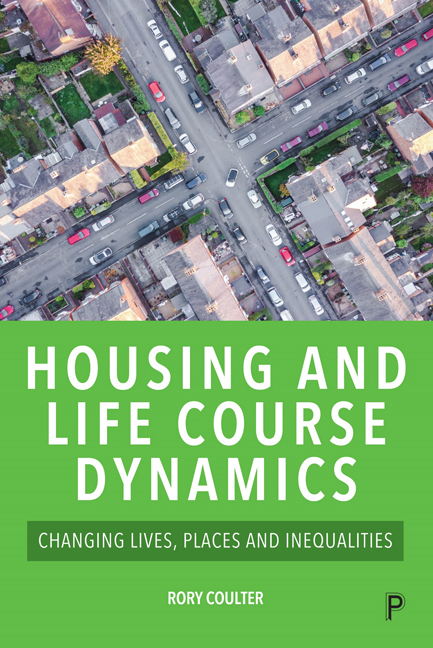Book contents
- Frontmatter
- Dedication
- Contents
- List of figures and tables
- List of abbreviations
- Notes on the author
- Acknowledgements
- Preface
- 1 Introduction
- 2 Housing: a life course perspective
- 3 Households and families
- 4 Learning and training
- 5 Employment and money
- 6 Health, well-being and care
- 7 Changing places
- 8 Understanding housing and life course dynamics
- Notes
- References
- Index
1 - Introduction
Published online by Cambridge University Press: 18 January 2024
- Frontmatter
- Dedication
- Contents
- List of figures and tables
- List of abbreviations
- Notes on the author
- Acknowledgements
- Preface
- 1 Introduction
- 2 Housing: a life course perspective
- 3 Households and families
- 4 Learning and training
- 5 Employment and money
- 6 Health, well-being and care
- 7 Changing places
- 8 Understanding housing and life course dynamics
- Notes
- References
- Index
Summary
Over the last twenty years, housing has risen up the policy agenda to become a priority issue for Global North governments. This transformation has been driven by a growing consensus that housing systems are in crisis. This crisis is thought to have many interrelated components – ranging from physical problems of supply and dwelling quality through to social issues of housing access, affordability and security – the precise blend of which varies from place to place. In Britain, much of the contemporary housing debate focuses on the origins of an affordability crisis and how to get more homes built.
Yet housing is clearly not in a state of crisis for everyone. Many people are satisfied with their homes, have enough space, have few problems paying for housing and are able to move to somewhere they want to live at a time broadly of their choosing. Some have also made a lot of money from the housing market over the years. As a result, there is a growing public awareness that inequalities between generations, between people living in different places and along axes such as class and ethnicity are defining features of contemporary housing crises.
Understanding and addressing these inequalities requires thoroughly grasping how housing is embedded into the multifaceted dynamics of people's lives. Yet as Clapham (2005) argued nearly twenty years ago, the housing field's tendency to focus on systemic issues (such as planning and supply, state policy, housing finance, market dynamics and so forth) means that much analysis views people simply as passively responding to contextual stimuli. While such approaches clearly have heuristic value for describing how contexts influence very general patterns of behaviour, they leave little room for the agency, aspirations, preferences, life events and interwoven social relationships that we all know from our own experiences have a major bearing on residential decisions and experiences.
This book's objective is to bring the dynamics of people's lives to the heart of how we think about housing and inequality in the 21st century. It aims to show how who we are matters for our housing and how housing helps make us into who we are. In this context, ‘who we are’ refers both to the dynamic course of our individual lives and also to the characteristics of the collective social units we belong to, such as our families and local communities.
- Type
- Chapter
- Information
- Housing and Life Course DynamicsChanging Lives, Places and Inequalities, pp. 1 - 20Publisher: Bristol University PressPrint publication year: 2023



